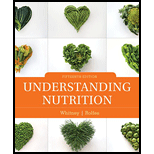
Concept explainers
To explain: The strategies that would be helpful when preventing the common digestive problems.
Introduction: The anatomical and physiological factors of human
Explanation of Solution
The common digestive problems with its strategies to prevent the common gastro-intestinal problems are described below:
1. Chocking: In chocking, the food has slipped into the trachea, and it mainly block the windpipe by which we breathe. While chocking, the person is unable to breath and cough. Without breathing, the person may suffer permanent brain damage within few minutes or may even die.
Prevention strategies: The different strategies to prevent the chocking disorder are as follows:
- While eating a person have to take small food bites.
- While food is inside the mouth, avoid laughing and talking.
- Avoid eating while breathing hard.
- Before swallowing the food, chew thoroughly.
2. Diarrhea: The disorder diarrhea is mainly distinguished as the continuous, loose and watery stools occur due to some intestinal infections. Diarrhea can cause a life-threatening dehydration. Also, various gastrointestinal disorders lead to diarrhea and these are irritable bowel syndrome, colitis, and celiac disease.
Prevention strategies: The different strategies to prevent the diarrhea are as follows:
- Mainly, in diarrhea, it is essential to take suggestion from the physicians.
- Avoid the strenuous activity.
- Take maximum rest to gain some energy.
- Drink fluids to restore losses.
3. Constipation: The disorder constipation leads to the decreasing frequency of passing the stools. This condition occurs due to the intake of less amount of liquid and intestinal obstruction.
Prevention strategies: The different strategies to prevent the constipation are as follows:
- To take high-fiber diet.
- To do exercise regularly.
- React promptly to the urge to defecate.
- Mainly, focus on drinking plenty of fluids.
4. Belching: The belching disorder results from by swallowing air. Every individual swallow a little amount of air with every mouthful of food. When people eat too fast, people may swallow much air.
Prevention strategies: The different strategies to prevent the belching disorder are as follows:
- Eat food slowly.
- Chew the food thoroughly.
- Relax during eating.
5. Intestinal gas: There are some foods that cause intestinal gas which leads to flatulence. The foods that are produce intestinal gas are mainly rich in carbohydrates like starches, sugars, and fibers. When these foods reach the intestine, bacteria digest them, and discharge gas as a by-product.
Prevention strategies: The different strategies to prevent the intestinal gas disorder are as follows:
- Avoid the food that causes intestinal gas.
- Take bothersome foods in moderation.
6. Gastro-esophageal reflux: A painful sensation that an individual feels behind the breastbone at the time of the lower esophageal sphincter permits the stomach filling components to reflux into the esophagus region is known as gastro-esophageal reflux. Gastro-esophageal reflux is also known as the heartburn. The heartburn leads to indigestion when an individual eat too quickly or overeat.
Prevention strategies: The different strategies to prevent the gastro-esophageal reflux are as follows:
- Take some liquids in between meals.
- Sit up while having food and elevate your head when lying down.
- Take small meals.
- Take 3 hours space after taking food before lying down.
- Take 2 hours space after taking food before doing exercise.
- Avoid doing smoking cigarettes or avoid the use of tobacco products.
- Do not use tight clothes.
- Try to lose weight if the person is overweight.
- Try to avoid coffee and caffeine.
- Do not take alcohol containing beverage.
- Avoid fried foods as well as high fat foods like chocolate and oily foods.
7. Ulcer: Ulcer is a lesion and the peptic ulcer is the lesion in the stomach lining and it is called stomach ulcer, and the lining of duodenum of small intestine called duodenum ulcer.
Prevention strategies: The different strategies to prevent the ulcer are as follows:
- Avoid the use of alcohol containing beverage.
- Avoid the intake of coffee and caffeine.
- Avoid the foods that aggravate your ulcer.
- Avoid smoking cigarette.
- Minimize the use of ibuprofen, aspirin, and naproxen use.
- Take medicine as directed by the physicians.
Want to see more full solutions like this?
Chapter 3 Solutions
Understanding Nutrition (MindTap Course List)
- What are the main functions of the stomach? What roles do enzymes and hormones play?arrow_forwardAn inflammation of the stomach and small intestine is known as ___________________. gastralgia gastroenteritis gastritis gastrosisarrow_forwardList the organs and accessory organs of the digestive system. On a separate piece of paper, list the main functions of each organ.arrow_forward
 Medical Terminology for Health Professions, Spira...Health & NutritionISBN:9781305634350Author:Ann Ehrlich, Carol L. Schroeder, Laura Ehrlich, Katrina A. SchroederPublisher:Cengage Learning
Medical Terminology for Health Professions, Spira...Health & NutritionISBN:9781305634350Author:Ann Ehrlich, Carol L. Schroeder, Laura Ehrlich, Katrina A. SchroederPublisher:Cengage Learning Human Physiology: From Cells to Systems (MindTap ...BiologyISBN:9781285866932Author:Lauralee SherwoodPublisher:Cengage Learning
Human Physiology: From Cells to Systems (MindTap ...BiologyISBN:9781285866932Author:Lauralee SherwoodPublisher:Cengage Learning Human Biology (MindTap Course List)BiologyISBN:9781305112100Author:Cecie Starr, Beverly McMillanPublisher:Cengage Learning
Human Biology (MindTap Course List)BiologyISBN:9781305112100Author:Cecie Starr, Beverly McMillanPublisher:Cengage Learning





